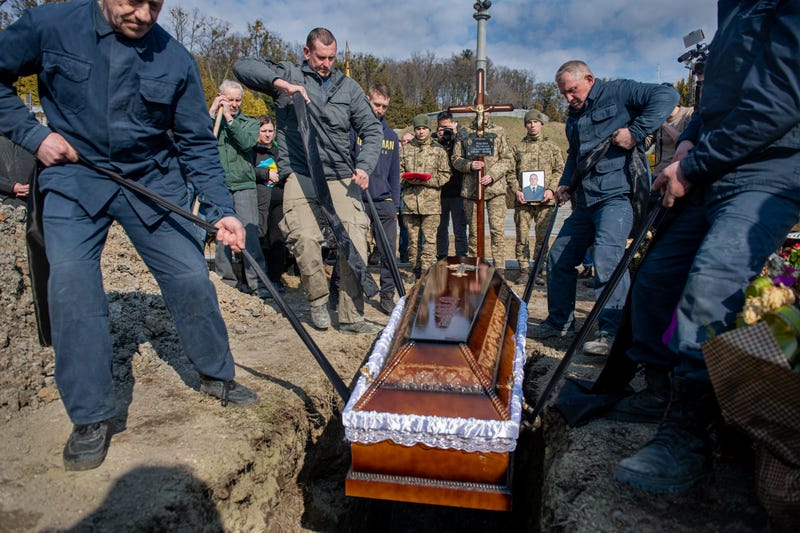
PHILADELPHIA (KYW Newsradio) — Two Philadelphia-area professionals are contributing their talents to the crisis in Ukraine wrought by Russian soldiers. One, a photographer, is working with Ukrainians from within the borders of the besieged country, and the other, a chef, is working to help Ukrainians who have made it outside their borders into neighboring Poland.
For a little more than a month, Michael Logsdon, a freelance photographer from Kensington, has been documenting Russia's assault on Ukraine, the atrocities of war he discovers while traveling around the country, and the stories of the loved ones left behind by the dead.
He spoke to KYW Newsradio from Kiev, where he had returned to take a break. He said he had just spent three days in Bucha, where he and some colleagues were following one of the volunteer teams picking up casualties of the war.
"It was just something that you can't believe,” Logsdon said.
'The world needs to understand what is happening here.'
Logsdon has photographed armed conflicts in Syria and the West Bank. What’s different now in Ukraine, he said, is the sheer number of civilian casualties.
"Men executed in the streets, not just men of fighting age, also people in their 80s. We saw women and children," he said.
“I mean, they were stacking bodies like cord wood."
He said his work can be taxing, and it can be tough to see so many Ukrainian dead. "But I think, for me, the much more difficult thing is speaking with the living," Logsdon said.
“One of the questions that I often ask is, why haven't you left? And the answer is fairly universal: ‘This is my country.’ ‘This is my home.’ ‘Where would I go?’ ‘Why would I leave?’ he said.
“And that's always been pretty striking, because, to imagine yourself in a similar situation in the U.S., and to stay under intense fire from one of the global military superpowers is, that's a pretty exceptional decision to make.”
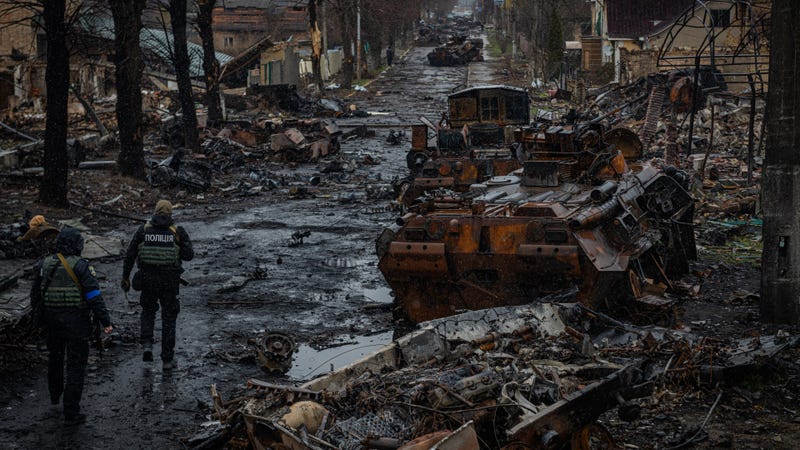
One might ask Logsdon why he hasn’t left Ukraine, but he says his mission — these stories — it’s too important for him to stop now.
"My hope is that, through these photographs, people who cannot be there can see what's happening and feel it in a visceral way,” he said.
“The world needs to understand what is happening here. If it’s not covered by myself, and by so many other photographers and journalists, no one is held accountable.”
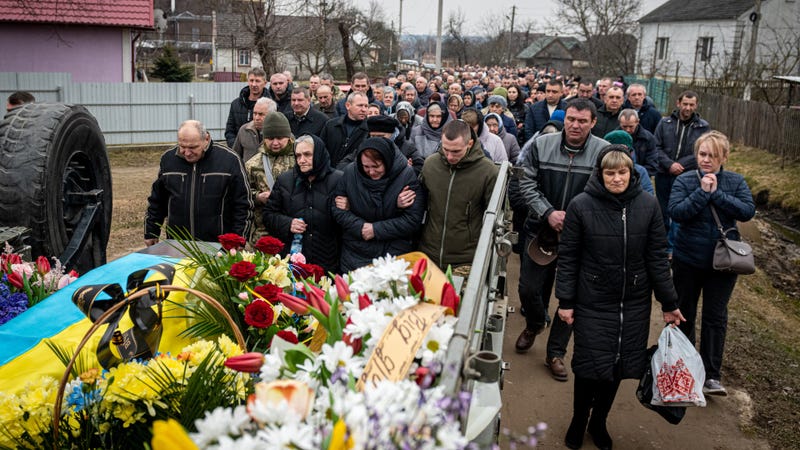
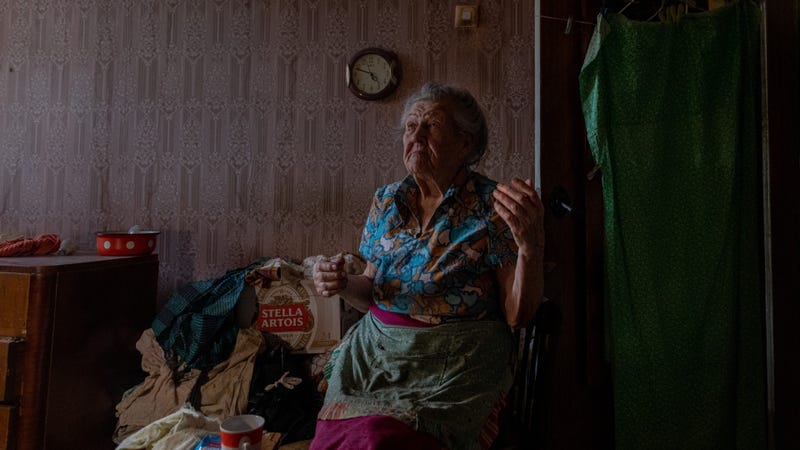
After a couple of days in Bucha, Logsdon wrote this journal entry.
“The past two days in Bucha have been ugly. Bodies litter the streets amid the rubble of a city that saw heavy fighting.
We visited the mass grave, places where civilians who appear to have been executed, burnt bodies of women, children, and men that, some suggested, exhibited signs of torture. Much of it so graphic, I’m not sure what to do with the images.
We heard stories of Russian soldiers killing civilians just because they felt like it. In one case Russian soldiers demanded the wheels from a man’s car. We were told the man complied and the soldiers left. As the two women told the story, they became emotional. They said the soldiers returned with another “short mean one [Russian soldier],” and while talking to the Ukrainian man again, the “short mean one” shot him to death without warning or reason.
The same women showed me the basement where they hid for more than a month. At one point, one of them said the Russians came down and, despite their pleas that there were women and children, they said the soldiers threw a grenade into the basement.
More upsetting than the mountains of dead has been the trauma of the living. The dead don’t have to suffer, but the living will carry these things forward in a conflict that is unlikely to end anytime soon.
'The smallest gesture of human kindness'
About 3 million people have been able to flee the devastation since Russia's invasion began in February, according to the United Nations. Poland has taken in 2 million of those refugees — a population as large as Warsaw, the nation's largest city and its capital.
Chef Olga Sorzano, owner of Baba’s Brew in Phoenixville, recently spent a week in Poland helping feed Ukrainian refugees crossing the border to safety.
Inspired by Philadelphia chef Michael Strauss’ volunteer work on the Ukraine border, Sorzano and travel partner chef Joncarl Lachman — of East Passyunk’s Noord and the Gayborhood’s Winkel — also traveled to Poland to volunteer for World Central Kitchen, a non-governmental organization that provides meals in response to natural disasters and humanitarian crises.
Sorzano, a native of Siberia, has family in Ukraine. She said she couldn’t sleep when the war broke out, and she was determined to do something to help.
“Even the smallest gesture of human kindness can change the world,” she said.
And she says the experience had an extraordinary impact on her life.
“In addition to the suffering, in addition to the pain and brutality, I also experienced the most amazing rise of humanity,” she said.
“It just puts all your life in perspective.”
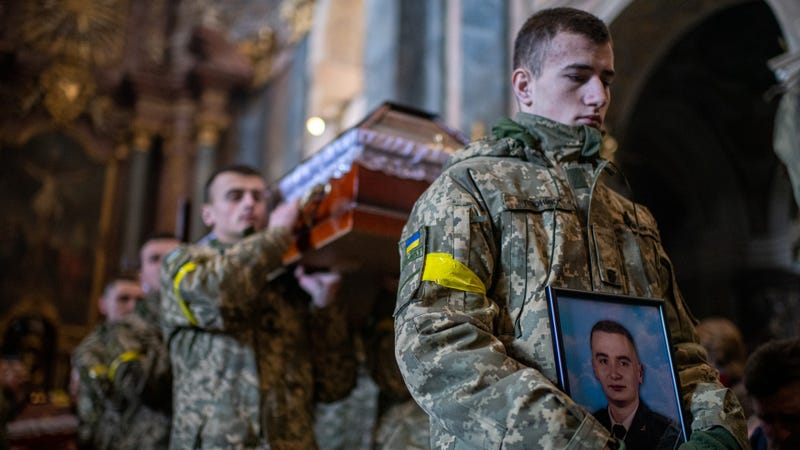
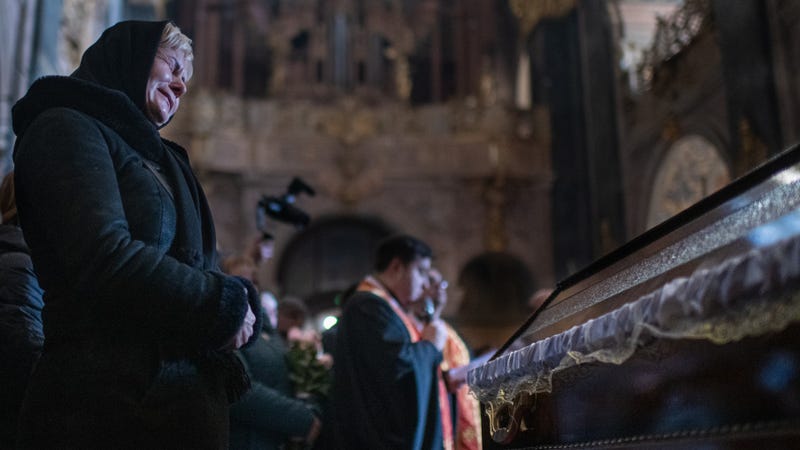
Sorzano said she recognizes how privileged she is living in America, where she doesn’t have to dodge bombs or hide out in an underground shelter.
“All those little complaints, all this kind of ‘first-world problem,’ it kind of sobers you up.” she said. “You just think about what is really important. How do you want to live your life?”
Since returning home, she says she has been trying to pass that inspiration on to others — to help in any way they can.
“You know, a cup of Starbucks is $5 — and $5, you know, you can feed a family for one day in Ukraine.”
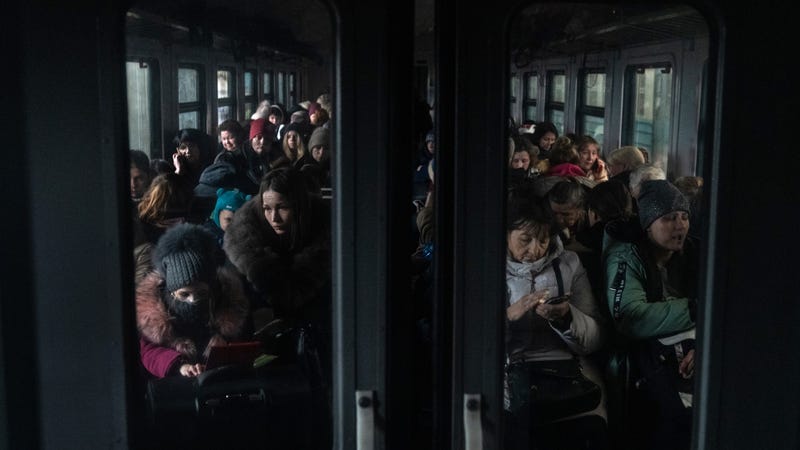
This week, she and Lachman are speaking at a private event to raise money for World Central Kitchen. But Ukraine needs much more than money, she said.
“Instead of just telling people, you know, donate to this charity — if you can share your personal experience, people feel a little bit more connected to that. It kind of makes this problem a little bit more personal for them,” she said.
It has become so personal for her that she says she just bought tickets to fly back again next month.
“I just do not want people completely jumping onto the next topic and forget this, because this issue will go on for a very, very, very long time.”
Time to recharge ... and return
On the other side of the border, Mike Logsdon and other journalists have been risking their lives to bring information to the rest of the world outside of the war zone.
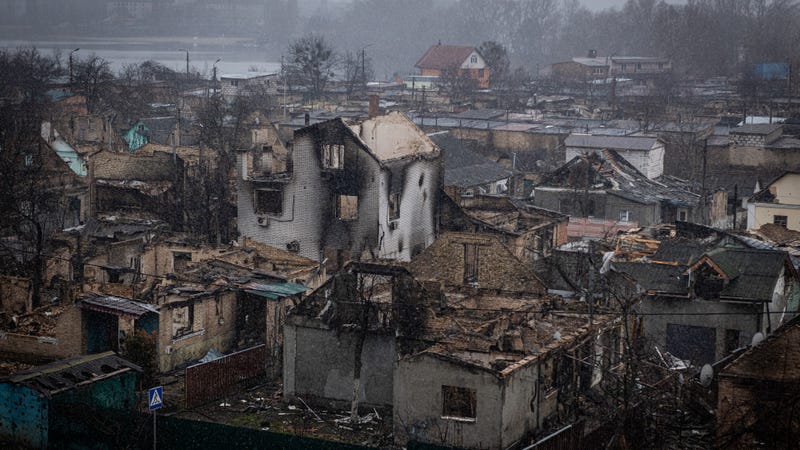
"War is a horrible thing. And if you decide to cover war and conflict, you accept a certain amount of risk in doing that," he said.
"We obviously wear body armor during most of the time we are working but you know, that only offers so much protection."
He told a story about traveling with his crew to photograph a site that had been attacked a couple of days earlier. "Just 60 seconds prior to us getting into the parking lot, a shell hit, and unfortunately killed a journalist there."
Incidents like that may be a near-miss physically, but they still take an internal toll, he said. When covering atrocities, it's crucial to pause sometimes to consider mental health.
"You need to maintain a certain amount of detachment, I believe, to do the work, because it can become emotionally overwhelming. And so I think a lot of the feelings kind of settle in once you're out of the country," he said.
He says he's contemplating returning to Philadelphia to recharge for a bit. And then — back to work in Ukraine to continue telling the truth of war.




